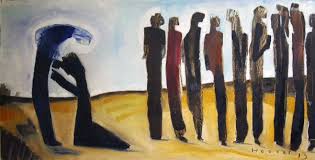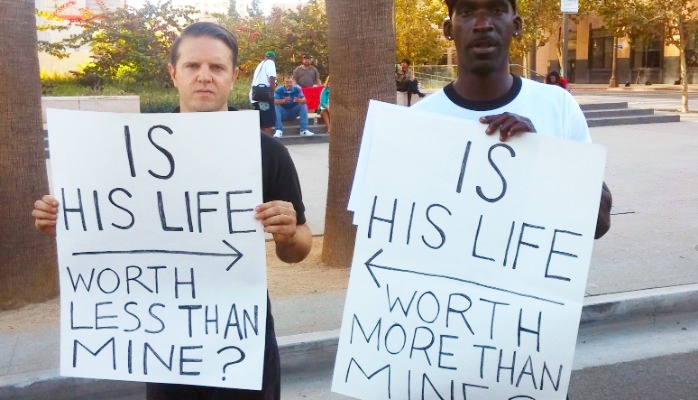Good Friday
“For we do not have a high priest who is unable to sympathize with our weaknesses, but one who has similarly been tested in every way….” Hebrews 4:15
This Friday is called “good” because, according to one spiritual writer, it’s the day on which “the primary human problem, the core issue that defeats human history, is both revealed and resolved.”
What he’s referring to is that the inclination to keep repeating the sin of Cain against Abel, the sin of violence, the sin of the human inclination to find a multitude of ways to kill one another – physically or emotionally – is finally resolved.
That resolution comes through Jesus’ decision to die for us, “not in the sense of ‘in place of’ but in ‘solidarity with.’”
In other words, Jesus didn’t die on a cross to appease an angry God and “make up” for the world’s sin, like so many of us were taught years ago.
Our better understanding of Scripture now helps us to see that what Jesus was doing was showing us with utter clarity that we are so passionately loved by God that he wanted to identify totally with us in our places of deepest pain and sorrow.
Good Friday is all about solidarity, not appeasement.
It’s about Jesus dying with us, more than for us.
It’s about a God who accompanies us, especially in our darkest most tragic moments.
Good Friday reminds us how merged and fused the God of Jesus is with each one of us. He is a God who has chosen to join us in total solidarity with all the tragedies and heartaches of human history, and with our own personal agonies of loss and shame and emptiness and betrayal.
Take a close look at the suffering Jesus endured on this one day and at how closely the emotional losses he suffered align with our own.
First, he is betrayed – betrayed by Judas, one of those twelve specially chosen people we call Apostles – betrayed by one who could get close enough to him to kiss him.
Then he is betrayed by Peter, the “rock upon which I will build my church,” – not once, but three times.
Second, he is abandoned. He is abandoned by all his disciples who flee to Galilee in terror. Only a few women remain “who watch from a distance.”
But he isn’t abandoned only by his friends.
He experiences abandonment even from his Father with whom he developed a profoundly intimate relationship:
“My God, my God, why have you abandoned me?”
Jesus experiences a conviction that he is all alone.
Now we enter the sphere of suffering that is most emphasized on Good Friday: the physical horrors he endured.
They begin with the ghastly torment of being mocked and spat upon and flogged. This was a form of torture that preceded a crucifixion. This involved having a crown of thorns pressed into his head while his torturers knelt before him shouting: “Hail, King of the Jews.” Then there were the whips with sharp metal pieces attached to them that would shred the skin to the point of causing death to many.
Finally, came the crucifixion itself.
Crucifixion was the most fearful, terrible form of execution at that time. It was really a slow form of torture; it was public; it was excruciatingly painful. Its purpose was intended to terrorize the population and serve as a deterrent to any offense against the Empire.
How can God let this happen?
How can God allow any of the terrible suffering that takes place in our world?
Jesus evidently felt that same anguish, and maybe even asked the same questions.
The answer to all the “whys” is singular:
God is demonstrating that through Jesus, and in the most horrifyingly vivid way possible, what is truly needed for us to become a people who are healed at our core is death, but a wholly different kind of death – the death of our egos; the death of our illusions of grandeur; the death of our lavish pretenses; the death of our self-defeating behaviors.
Why this kind of death for us?
Because it is the only way to a transformation of our souls.
The problem, though, with the symbol of the cross is that in today’s world it has lost its power, its savagery.
It’s almost become a kind of icon that we use for decorative purposes.
For Jesus it was painfully real. For each of us to imitate that crucifixion within our own hearts will be also.
But here is the ultimate beauty of this day awash in darkness:
A tomb will be emptied; a death will be vindicated; a hope will be renewed; a conviction will take hold of us; a life of freedom will be attainable; darkness will be replaced by light.
On this Good Friday, may we each join in a prayer inspired by Richard Rohr, OFM (with some additions of my own):
“Crucified Jesus, you are not a stranger to my soul; you are not foreign to our human history. You have revealed, resolved, and forgiven it all on the cross. You have suffered with us in our suffering. Your cross now stands beside our own crosses. It is now the sign to us all that You suffer in all human suffering, that You hurt with the hunger of children throughout the world, that You hurt with the humiliation and the anguish of everyone tormented by abuse and injustice, that You hurt whenever we are in real pain. I join the whole world today in thanking you. This is indeed a good Friday.”
Ted Wolgamot, Psy.D.






